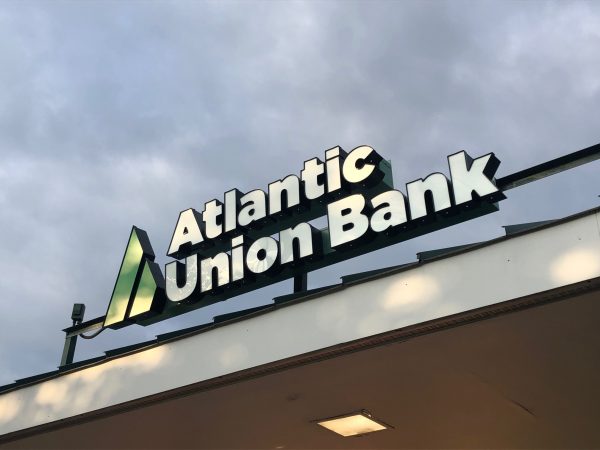Rebranding a $17 billion bank isn’t easy and it doesn’t come cheap.
But John Asbury, CEO of what until Monday was known as Union Bank & Trust, has an anecdote that he said illustrates why it was necessary for the Richmond-based company to make the complicated switch to become Atlantic Union Bank.
“I was approached by a local businessperson who thought he had opened an account (with Union) online, only to go into a branch, be told he hadn’t and eventually figured out he had opened an account at Union Bank in California,” Asbury said.
With that, the bank opened for business this week as Atlantic Union Bank, giving it a unified brand that had an available national trademark – something the company never had as Union Bank & Trust. There are around a dozen other banks around the country using some form of Union Bank in their name.
Planning for the rebrand began more than a year ago, after Union had acquired Xenith Bank, a Richmond-based institution that brought with it a presence in Hampton Roads, Maryland and North Carolina.
The idea for a new name was accelerated further by Union’s acquisition of Northern Virginia-based Access National Corp., and its Access National Bank and Middleburg Bank brands. That deal closed earlier this year.
“It really had to be dealt with,” Asbury said. “It was the perfect time to address the issue.”
In addition to changing the signage at its 170-plus offices, a group within Union was tasked with turning over every stone that had a Union logo on it to make sure they got the conversion treatment.
It was everything from customer’s bank statements to mobile apps to social media pages – even down to employee email signatures and LinkedIn pages, and the signage of Little League baseball fields that the bank sponsors around the state.
“There are literally thousands of touchpoints,” said Duane Smith, chief marketing officer.
And that was just on the retail side of the business. The company also changed the name of its Union Bankshares holding company to Atlantic Union Bankshares and its stock ticker symbol from UBSH to AUB – all of which came with separate shares of necessary paperwork.
It also changed the name of its Union Wealth Management arm to Middleburg Financial – taking advantage of the Middleburg brand’s longtime local presence as a wealth management brand in Central Virginia and its recognizable fox logo.
Getting out the word
Then there’s the messaging. That included letting institutional investors know of all the changes so that stock trading continues without confusion and letting longtime Union customers know that this is just a name change and not a new company.
Complicating matters was that this all was done while the company completed the conversion of Access National and Middleburg’s IT systems over to Union’s, which bankers often describe as the most difficult part of absorbing another bank.
“In our world that’s like open heart surgery when you convert a bank,” Asbury said. “We have some people who literally spent two nights in the operations center, pulling all-nighters.
“To overlay a rebranding on top of a systems conversion – that’s pretty high-gradient,” he said.
As to the cost of the effort, the bank disclosed in its first-quarter earnings conference call that it expects to spend a total of $12 million to do the rebrand. About half of that will be spent this year, with the other half being expensed over five years.
The expenses this year will include additional signage changes, as about half of its offices have just temporary Atlantic Union Bank signs that will be replaced with permanent options, and its branches in North Carolina are still operating as Xenith Bank until Aug. 9.
While the new Atlantic Union Bank brand sets it up for likely further geographical expansion over time, Asbury said the bank is focused in the near term on growing from within.
It’s also plotting how best to capitalize on the pending combination of regional giants BB&T and SunTrust, a $66 billion deal that’s expected to have ripple effects in the Richmond market and elsewhere in Atlantic Union’s footprint.
Bankers such as Asbury are eager to see the extent of branch consolidation and likely deposit divestiture that will result from the deal.
“We count 281 branches between those two companies within two miles of each other,” Asbury said. “We predict they will close half their branches in greater Richmond.
“There will be friction and some level of dissatisfaction. This will be a multiyear disruption,” he said.
Asbury said getting the Atlantic Union brand in place now will position it for when the BB&T/SunTrust deal closes, as expected later this year.
“We feel we are prepared with this great alternative, the clear alternative to the (big banks),” he said.
Rebranding a $17 billion bank isn’t easy and it doesn’t come cheap.
But John Asbury, CEO of what until Monday was known as Union Bank & Trust, has an anecdote that he said illustrates why it was necessary for the Richmond-based company to make the complicated switch to become Atlantic Union Bank.
“I was approached by a local businessperson who thought he had opened an account (with Union) online, only to go into a branch, be told he hadn’t and eventually figured out he had opened an account at Union Bank in California,” Asbury said.
With that, the bank opened for business this week as Atlantic Union Bank, giving it a unified brand that had an available national trademark – something the company never had as Union Bank & Trust. There are around a dozen other banks around the country using some form of Union Bank in their name.
Planning for the rebrand began more than a year ago, after Union had acquired Xenith Bank, a Richmond-based institution that brought with it a presence in Hampton Roads, Maryland and North Carolina.
The idea for a new name was accelerated further by Union’s acquisition of Northern Virginia-based Access National Corp., and its Access National Bank and Middleburg Bank brands. That deal closed earlier this year.
“It really had to be dealt with,” Asbury said. “It was the perfect time to address the issue.”
In addition to changing the signage at its 170-plus offices, a group within Union was tasked with turning over every stone that had a Union logo on it to make sure they got the conversion treatment.
It was everything from customer’s bank statements to mobile apps to social media pages – even down to employee email signatures and LinkedIn pages, and the signage of Little League baseball fields that the bank sponsors around the state.
“There are literally thousands of touchpoints,” said Duane Smith, chief marketing officer.
And that was just on the retail side of the business. The company also changed the name of its Union Bankshares holding company to Atlantic Union Bankshares and its stock ticker symbol from UBSH to AUB – all of which came with separate shares of necessary paperwork.
It also changed the name of its Union Wealth Management arm to Middleburg Financial – taking advantage of the Middleburg brand’s longtime local presence as a wealth management brand in Central Virginia and its recognizable fox logo.
Getting out the word
Then there’s the messaging. That included letting institutional investors know of all the changes so that stock trading continues without confusion and letting longtime Union customers know that this is just a name change and not a new company.
Complicating matters was that this all was done while the company completed the conversion of Access National and Middleburg’s IT systems over to Union’s, which bankers often describe as the most difficult part of absorbing another bank.
“In our world that’s like open heart surgery when you convert a bank,” Asbury said. “We have some people who literally spent two nights in the operations center, pulling all-nighters.
“To overlay a rebranding on top of a systems conversion – that’s pretty high-gradient,” he said.
As to the cost of the effort, the bank disclosed in its first-quarter earnings conference call that it expects to spend a total of $12 million to do the rebrand. About half of that will be spent this year, with the other half being expensed over five years.
The expenses this year will include additional signage changes, as about half of its offices have just temporary Atlantic Union Bank signs that will be replaced with permanent options, and its branches in North Carolina are still operating as Xenith Bank until Aug. 9.
While the new Atlantic Union Bank brand sets it up for likely further geographical expansion over time, Asbury said the bank is focused in the near term on growing from within.
It’s also plotting how best to capitalize on the pending combination of regional giants BB&T and SunTrust, a $66 billion deal that’s expected to have ripple effects in the Richmond market and elsewhere in Atlantic Union’s footprint.
Bankers such as Asbury are eager to see the extent of branch consolidation and likely deposit divestiture that will result from the deal.
“We count 281 branches between those two companies within two miles of each other,” Asbury said. “We predict they will close half their branches in greater Richmond.
“There will be friction and some level of dissatisfaction. This will be a multiyear disruption,” he said.
Asbury said getting the Atlantic Union brand in place now will position it for when the BB&T/SunTrust deal closes, as expected later this year.
“We feel we are prepared with this great alternative, the clear alternative to the (big banks),” he said.





